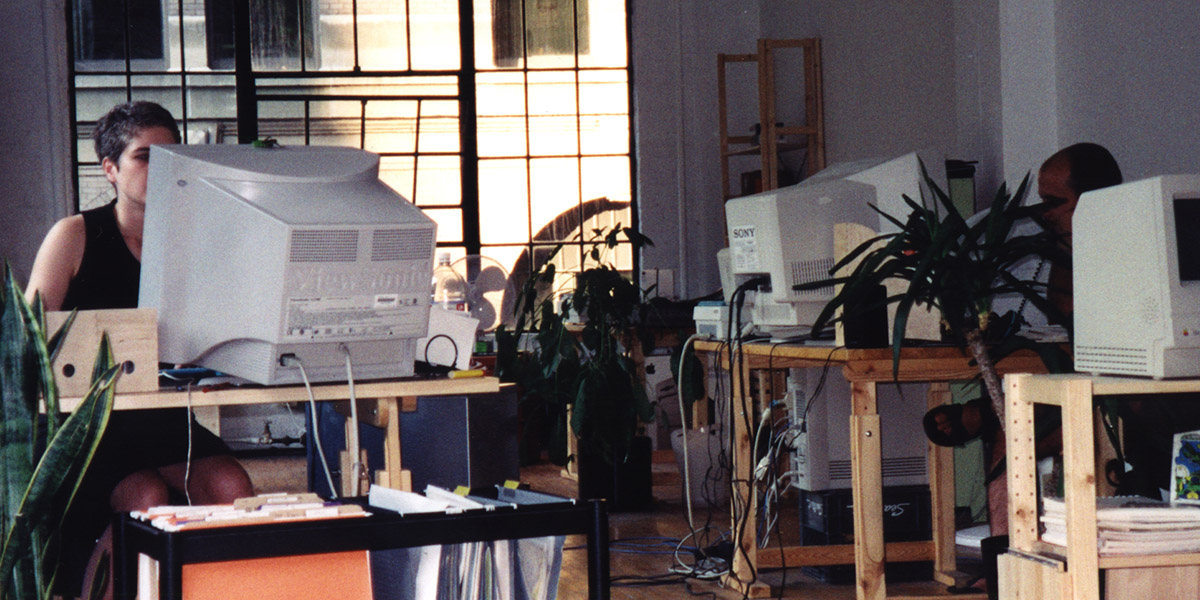A humble approach to entrepreneurship
When I co-founded Plank nearly 20 years ago, it was with some personal savings, a couple of brave friends, and a dream to make the internet a slightly better place. I had no expectations, no vision, no business plan. I only knew that I didn’t want to work for someone else, and that I wanted to continue designing and developing creative digital projects after completing Concordia’s Communication Studies program. With my co-founder, Christiane Magee, and Steve Bissonnette (who’s still here as Managing Partner), we started small, and grew slowly but steadily. The journey of running Plank has had its ups and downs, but I’m proud of the solid company we’ve built over the years.
These days, I find the conversation around entrepreneurship is overly focused on the startup model, when that’s just one of many ways to start a business. I think something is deeply broken when we put too much stock into a narrative that rewards high-stakes gambling of other people’s money with a minimal chance of success. In the end, it’s the investors who win big, rarely the people who put their ideas and work on the line.
I want to advocate for a more humble approach to entrepreneurship. I like to think of Plank as a local deli; a business that’s well-known in its community for delivering an excellent product with personal service. We’re not taking over the world, but we’re carving out our niche with care and diligence. I think it’s something to be celebrated in the digital world.
While other companies try to make billions and go public, I’m proud that I can provide employment for a dozen or so talented folks in the city that I love. There are people here who have bought homes, started families, and pursued their passions because of a stable work environment. No one’s making a killing, but we’re doing just fine, thanks.
If I Had a Time Machine….
I can’t go back and give my younger self advice, but I can give it to you! Here are some of the things I’ve learned along the road that I think are worth sharing.
Top Ten Lessons Learned
- Be proud that you are trying to make great things. It’s possible to be humble and confident at the same time.
- Focus first on what you’re passionate about. Money will come if you are good at what you do.
- Wake up everyday wanting to go to the office. If you don’t feel that way, change something at the office.
- If your instincts tell you something is wrong, follow your gut. Not every project or client is a perfect match, and knowing when to say no has made Plank a better company than always saying yes.
- You know that great idea you had? You should have done it before someone else did.
- Be genuine, honest and helpful. Treat your employees and your clients with respect and empathy.
- You can’t make everyone happy. One of the toughest things is ending a relationship that’s going nowhere, whether it’s with a client or an employee, but it has to be done.
- Don’t be surprised if you are still doing this in 20 years. Look forward to that prospect and revel in it as something to be proud of.
- Good times will always replace bad times.
- Don’t think you can run a business by yourself. Having a partner is a good and necessary thing. Never go into battle alone.
Building Your Dream Team
There’s no magic equation to build the best team. In meeting 100+ different digital studios, none of them are structured exactly the same.
- At Plank, we try to keep an evenly balanced team of administration, design, development, and management. It seems to work for us.
- Collaborate with your peers, and learn from them. Be humble enough to ask questions and never be afraid to seek help from others.
- Running a successful business is also about finding people to fill in the gaps where your skills don’t quite cut it.
- Think of your team like a baseball team and build the best one you can given the resources you have. Another great analogy is to look at the team like a Dungeons & Dragons party where you need a proper mix of clerics, barbarians and sorcerers, and thieves. 🙂
- Lead by example. A team leader shouldn’t feel they’re above certain tasks. If the garbage needs to be taken out, do it. Avoid creating a sense of hierarchy, which can lead to resentment among the team. (File under: Things I Learned at Summer Camp).
Staying Motivated
- First, accept that you won’t always be motivated. There will be times of stress and burnout and you need to be prepared to work through them. You will have good days and you will have bad days.
- Seek out your dream clients, people whose work you’re genuinely interested in, and don’t be afraid to approach them. Plank has worked with big names like Michael Moore and Rush because I was a fan and reached out to them.
- Set goals. While I’ve never had a formal business plan, I have learned to set annual, quarterly and monthly goals, and check in with the team regularly to make sure we meet them.
- Keep space in your life for passion projects. Hobbies can push your personal boundaries and creative limits in ways you don’t expect.
- Surround yourself with people that you enjoy spending time with. The times when I’m most stressed and unmotivated is when I’m not enjoying our team dynamic.
So much of Plank’s success has been because of strong relationships – with colleagues, clients, and community members. I’m grateful to everyone who’s helped me learn and grow as an entrepreneur.
Image: Plank co-founders Christiane Magee and Warren Wilansky in 1999.


Leave a Reply